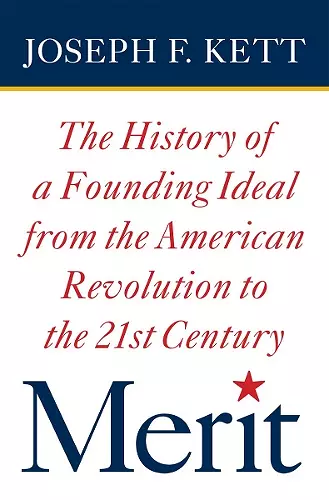Merit
The History of a Founding Ideal from the American Revolution to the Twenty-First Century
Format:Hardback
Publisher:Cornell University Press
Published:15th Jan '13
Currently unavailable, and unfortunately no date known when it will be back

The idea that citizens’ advancement should depend exclusively on merit, on qualities that deserve reward rather than on bloodlines or wire-pulling, was among the Founding ideals of the American republic, Joseph F. Kett argues in this provocative and engaging book. Merit’s history, he contends, is best understood within the context of its often conflicting interaction with the other ideals of the Founding, equal rights and government by consent. Merit implies difference; equality suggests sameness. By sanctioning selection of those lower down by those higher up, merit potentially conflicts with the republican ideal that citizens consent to the decisions that affect their lives.
In Merit, which traces the history of its subject over three centuries, Kett asserts that Americans have reconciled merit with other principles of the Founding in ways that have shaped their distinctive approach to the grading of public schools, report cards, the forging of workplace hierarchies, employee rating forms, merit systems in government, the selection of officers for the armed forces, and standardized testing for intelligence, character, and vocational interests.
Today, the concept of merit is most commonly associated with measures by which it is quantified. Viewing their merit as an element of their selfhood—essential merit—members of the Founding generation showed no interest in quantitative measurements. Rather, they equated merit with an inner quality that accounted for their achievements and that was best measured by their reputations among their peers. In a republic based on equal rights and consent of the people, however, it became important to establish that merit-based rewards were within the grasp of ordinary Americans. In response, Americans embraced institutional merit in the form of procedures focused on drawing small distinctions among average people. They also developed a penchant for increasing the number of winners in competitions—what Kett calls "selection in" rather than "selection out"—in order to satisfy popular aspirations. Merit argues that values rooted in the Founding of the republic continue to influence Americans’ approach to controversies, including those surrounding affirmative action, which involve the ideal of merit.
Historian Kett (Univ. of Virginia) provides a wide-ranging history of the idea of merit, tracing its shaping of the US over the course of three centuries. Much has been written about the importance of 'equality' and 'consent' to the American experience; comparatively, 'merit' has been overlooked. For Kett, the US was 'born meritorious,' as advancement by merit was a pillar belief of American revolutionaries.... Summing Up: Recommended.
-- M.G. Spencer * Choice *"Kett's dense and detailed history argues that the ideal of merit was vital to the founding and development of the United States... This ambitious and wide-ranging book is an apt complement to such indispensable studies of the subject... " —Darrin M. McMahon
* The Journal of Interdisciplinary History *Kett's history of decision making about talent is consistently strong and readable.... The bittersweet legacy for American history is a partial triumph of meritocracy. There is a perennial tension in attempts to reconcile equality and excellence. Setting asside abuses of blatant favoritism, a typical situaion is as thus: whether in admission to an academically selective college, in selecting candidates for a judgeship or cabinet position, in being hired as a CEO, or in choosing an award-winning book, the social fact is that often most applicants are qualified, perhaps highly qualified. The corollary is that even talented people can be left out in high-stakes competition. That may not be the way of the world, but as Kett's excellent book documents, it is the American way.
-- John R. Thelin * The Journal of Southern History *The young American republic seemed a nation peculiarly conducive to recognizing merit, or a 'quality deserving reward' in public life. Here Kett traces the evolution of this ideal from the revolution forward, pointing out how merit frequently clashed with other ideals such as equality.... He succeeds in a tightrope performance, tying what seem disparate phenomena together in a frequently delightful narrative..... Kett’s book has opened new historical avenues.
* Library Journal *This book provides a veritable treasure trove of historical anecdotes, facts, statistics, and studies relating to American educational history and its intersections with American political history. The book is impressively researched throughout and provides a number of insightful suggestions at the intersections of American political history/theory and educational history/theory. For these reasons, Kett's book should prove valuable to a wide range of scholars of American political thought, including both historians and political scientists.
-- S. Adam Seagrave * Political Science QuarterISBN: 9780801451225
Dimensions: 235mm x 155mm x 27mm
Weight: 907g
344 pages